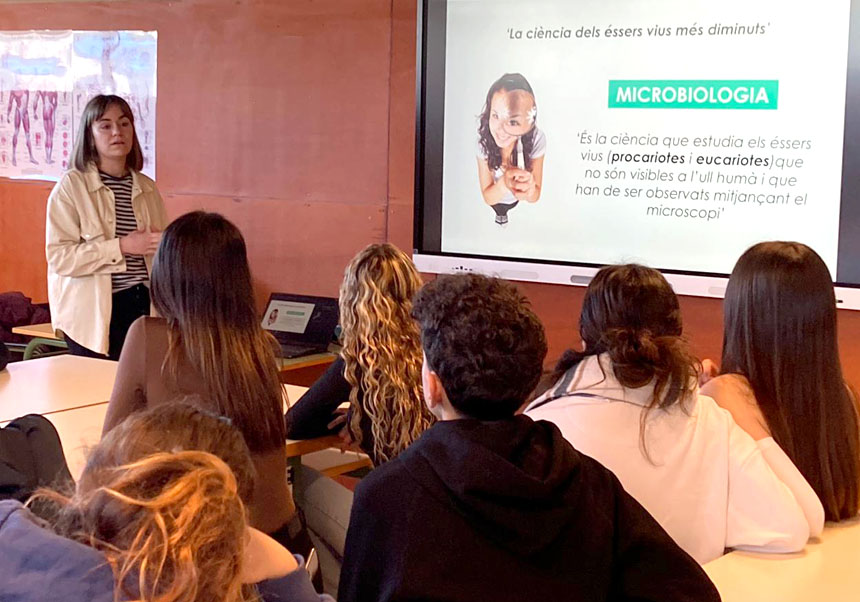
Ángela Vidal Verdú and Paola Corbín Agustí, researchers at the Institute of Integrative Systems Biology (I2SysBio), a joint centre of the University of Valencia (UV) and the Spanish National Research Council (CSIC), have brought the microbial world closer to pre-university students of Ibiza within the Amgen TransferCiència 2024 program, which aims to promote learning and scientific vocations in biotechnology and genetics.
Thus, Àngela Vidal Verdú (doctoral researcher) has carried out the seminar “Life in plastic, it’s fantastic!” at the IES Sant Agustí in Eivissa. and the practical activity titled “Discovering microbial bioprospecting in the laboratory”, in which it has been revealed that plastic pollution is an environmental problem that already affects all ecosystems on the planet. Thus, the advantages and disadvantages of this essential material were discussed. “To provide solutions, biotechnology works on microbial bioremediation, that is, the study and use of microorganisms or their activities to degrade these contaminating compounds”, explained Àngela Vidal.
In the workshop she learned what bioprospecting and microbial bioremediation is, and a practical activity was carried out where she discovered how to work with microorganisms in the microbiology laboratory. The different ways of cultivating microorganisms, the importance of maintaining sterility and how to identify which microorganisms have been isolated in the different culture media were also explained.
Furthermore, on the same Friday, March 15, Paola Corbín (doctoral researcher) presented a seminar to the IES Sa Colomina in Ibiza, “Microorganisms and the human being” and a practical activity titled “The race for the vaccine against red disease”, with which the microbial world and some of its curiosities have been addressed, with a particular emphasis on bacteria and their relationship with humans. Thus, the role of probiotics, beneficial bacteria for human health, has been delved into the reasons why they are a central pillar in the context of scientific research at the University of Valencia.
In the second part, the students have become scientists in search of the design of an oral vaccine based on probiotics against the red disease. Through a hands-on approach, they have learned and applied essential procedures such as growing cultures in Petri dishes, understanding genetic modification, and performing an ELISA assay for the detection of an antigen.
The Amgen TransferCiència 2024 program, organised by the biotechnology company Amgen and the Catalan Foundation for Research and Innovation (FCRI in its Catalan acronym), aims to improve science learning, with a special focus on biotechnology and genetics.
Images:













